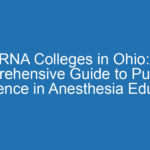If you’re passionate about healthcare and interested in becoming a Certified Registered Nurse Anesthetist (CRNA), Maine offers opportunities for pursuing your education in this field. CRNAs play a vital role in the healthcare system, administering anesthesia and ensuring patient safety during surgical procedures. Maine has only one primary crna school and in this article, we will explore everything you need to know about the CRNA college and help you embark on a rewarding career in nurse anesthesia.
What is CRNA All About and Reasons To Pursue A Career In The Field
Certified Registered Nurse Anesthetists (CRNAs) are advanced practice registered nurses (APRNs) who specialize in providing anesthesia care to patients in a variety of healthcare settings. Here’s a summary of what CRNAs do and reasons why you might consider pursuing a career as a CRNA:
1. Anesthesia Expertise:
CRNAs are highly skilled professionals who administer anesthesia to patients before, during, and after surgical or medical procedures. They work closely with surgeons, anesthesiologists, and other healthcare professionals to ensure patient safety and comfort during anesthesia administration.
Education and Training: To become a CRNA, you must complete a Master’s or Doctoral degree in nurse anesthesia. The educational program includes rigorous coursework in advanced physiology, pharmacology, pathophysiology, and anesthesia principles.
2. Autonomy and Responsibility:
CRNAs often work independently and have a high level of autonomy in their practice. They are responsible for assessing patients, determining appropriate anesthesia plans, administering anesthesia, monitoring patients’ vital signs, and managing pain during and after procedures. This level of responsibility allows CRNAs to play a critical role in patient care.
3. Versatile Career Opportunities:
CRNAs are in demand and can work in various healthcare settings, including hospitals, surgical centers, dental offices, obstetric units, pain management clinics, and the military. This versatility provides opportunities for career growth, specialization, and the chance to work in different healthcare environments.
4. High Earning Potential:
CRNAs are among the highest-paid nursing professionals. Their specialized skills and responsibilities often come with competitive salaries. Additionally, CRNAs may have the opportunity to earn additional income through overtime, on-call shifts, or working in high-demand areas or specialties.
5. Job Outlook and Demand: The demand for CRNAs continues to grow due to factors such as an aging population, increased need for surgical procedures, and expanded roles of APRNs in healthcare. This strong job outlook provides stability and potential job opportunities in various geographic locations.
6. Patient Care and Impact: Becoming a CRNA allows you to have a direct impact on patient care and outcomes. You are involved in every step of the anesthesia process, ensuring patient safety, pain management, and comfort during procedures. Being able to provide vital support to patients during critical moments can be rewarding and fulfilling.
The Importance of Choosing the Right CRNA College
Selecting the right CRNA college is a critical step in your journey toward becoming a nurse anesthetist. It’s important to consider factors such as graduates’ success, accreditation, clinical experiences, faculty expertise, and curriculum.
Choosing a reputable CRNA college ensures that you receive the necessary education and training to excel in your future career.
To help you make a good decision, we have a list of the top universities to study Nurse Anesthesia in Maine and all the information you need to know.
University of New England (UNE)
The University of New England, located in Portland, is the primary institution in Maine that offers a CRNA program. UNE’s Nurse Anesthesia programs provide aspiring CRNAs with the highest quality education and training.
The University of New England (UNE) offers a comprehensive CRNA (Certified Registered Nurse Anesthetist) program for individuals interested in pursuing a career in nurse anesthesia. Here’s everything you need to know about UNE’s CRNA program:
Program Overview: UNE’s CRNA program is designed to prepare students to become advanced practice nurse anesthetists. It is a full-time, 36-month program that combines didactic coursework, simulation experiences, and clinical practice. The program offers a master’s degree in Nurse Anesthesia upon completion.
Accreditation: UNE’s CRNA program is accredited by the Council on Accreditation of Nurse Anesthesia Educational Programs (COA). Accreditation ensures that the program meets the highest standards of quality and prepares students for professional practice.
Curriculum: The curriculum of UNE’s CRNA program is structured to cover a wide range of topics relevant to nurse anesthesia practice. Courses include advanced pharmacology, physiology, pathophysiology, principles of anesthesia, anesthesia techniques, and patient safety. The program also includes clinical practicum experiences to provide hands-on training in anesthesia delivery.
Clinical Experiences: Clinical experiences are a crucial component of UNE’s CRNA program. Students gain practical experience in a variety of clinical settings, including hospitals, surgical centers, and other healthcare facilities. These experiences allow students to apply their knowledge, develop critical skills, and work alongside experienced CRNAs and anesthesiologists.
Faculty: The faculty at UNE’s CRNA program consists of experienced CRNAs and anesthesiologists who bring their expertise and real-world insights into the classroom. They provide mentorship, guidance, and support to students throughout their educational journey.
Admission Requirements: To be considered for admission to UNE’s CRNA program, applicants must meet certain requirements. These typically include holding a Bachelor of Science in Nursing (BSN) degree from an accredited institution, a valid registered nurse (RN) license, a minimum GPA requirement, letters of recommendation, a personal statement, and an interview. Meeting the minimum requirements does not guarantee acceptance, as the program is competitive.
Career Outlook: Upon successful completion of UNE’s CRNA program and obtaining certification, graduates can pursue a fulfilling career as CRNAs. CRNAs are in high demand, and the job outlook for this profession is expected to be favorable, with opportunities for employment in hospitals, surgery centers, outpatient facilities, and other healthcare settings.
Benefits of Choosing a CRNA College in Maine
Quality Education: CRNA colleges in Maine, such as UNE, offer high-quality education and training. Experienced faculty members and comprehensive curricula ensure that students receive a solid foundation in anesthesia practice.
Accreditation: Reputable CRNA program in Maine, like UNE’s, id accredited by recognized accrediting bodies. Graduating from an accredited program enhances your professional credibility and increases your chances of securing employment opportunities.
Clinical Experience: CRNA colleges in Maine provide ample clinical experience opportunities. These experiences allow students to gain hands-on training in real healthcare settings, developing their clinical skills and confidence in administering anesthesia.
Networking Opportunities: Choosing a CRNA college in Maine can provide valuable networking opportunities. These colleges often have connections with hospitals, healthcare organizations, and industry professionals, which can help students establish connections and potentially lead to job opportunities in the future.
Why You Should Start A Crna Career in Maine
Maine, famous for it’s stunning coastlines is a charming state and a great place to start a crna career and here is why:
Growing Demand: The demand for CRNAs is expected to continue growing in Maine, as well as nationwide. CRNAs play a vital role in providing anesthesia care, and their services are needed in various healthcare settings, including hospitals, surgical centers, and outpatient clinics.
Rural Areas: Maine has a significant rural population, which often faces challenges in accessing healthcare services. CRNAs can help bridge this gap by providing anesthesia services in rural areas where there may be a shortage of anesthesiologists. This presents opportunities for CRNAs to contribute to the healthcare needs of underserved communities.
Autonomy and Responsibility: CRNAs in Maine enjoy a high level of professional autonomy and responsibility. They work as independent practitioners, collaborating with other healthcare professionals to ensure safe and efficient anesthesia care. This level of autonomy allows CRNAs to have a direct impact on patient outcomes and contribute to the overall healthcare system.
Competitive Salaries: CRNAs in Maine are typically well-compensated for their expertise and responsibilities. CRNAs in Maine earn competitive salaries that reflect their advanced level of education and skill.
Career Flexibility: CRNAs have the flexibility to work in various healthcare settings. They can choose to work in hospitals, surgical centers, obstetric units, pain management clinics, or even in the military or research institutions. This diversity of options allows CRNAs to tailor their careers to their interests and professional goals.
Collaborative Environment: Maine has a collaborative healthcare environment that values teamwork and interdisciplinary collaboration. CRNAs have the opportunity to work closely with surgeons, anesthesiologists, nurses, and other healthcare professionals, fostering a collaborative approach to patient care.
Professional Growth and Development: CRNAs in Maine have access to opportunities for professional growth and development. They can pursue advanced certifications, participate in continuing education programs, and engage in research and leadership roles within the field of anesthesia. These avenues allow CRNAs to enhance their knowledge and skills, opening doors to further career advancement.
Conclusion:
If you aspire to become a CRNA and are considering pursuing your education in Maine, the University of New England offers a reputable CRNA program. By choosing a CRNA college in Maine, you can receive a quality education, gain valuable clinical experience, and open doors for career advancement in the field of nurse anesthesia. Remember to research and consider factors such as program rankings, faculty expertise, clinical affiliations, and student outcomes when selecting a CRNA college that aligns with your goals and aspirations.




